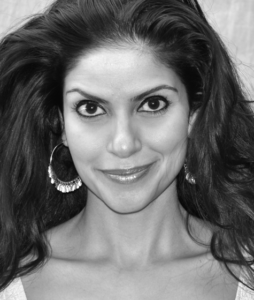by MAX SPARBER
Community News Editor
The 17th Annual Twin Cities Mental Health Education Conference, Oct. 22 at Temple Israel, will feature a keynote address by Melody Moezzi, Iranian-American activist, award-winning writer and attorney, and author of Haldol and Hyacinths: A Bipolar Life.

In conversation with The American Jewish World, Moezzi explained the origin of her book, which details her own diagnosis as bipolar.
“I basically wrote the book that I wish existed when I was diagnosed,” she said. “I read a lot of memoirs, but I didn’t see my experience reflected as a non-white woman.”
She explains that as an Iranian-American, she experienced being bipolar as “clinical and cultural”: “For me it was a metaphor for my experience as an Iranian-American. I love and belong to these two places that never in my life have been reconciled.”
Just as she has two identities, Iranian and American, she has two emotional poles, although she is quick to point out that this is reductive; there isn’t just a manic side and a depressive side to her experiences.
Nonetheless, when she was diagnosed, she explains that her response was “Oh, of course.”
She explains that her experiences gave her the tools to understand her diagnosis, because they seemed to parallel how she had already experienced “as an Iranian, as a member of two cultures that couldn’t get along politically, that were supposed to be arch-enemies.”
Additionally, she grew up in a world that was hostile to her Iranian identity. “As an Iranian-American woman, my identity has been politicized since I was very young. But I have never been ashamed of my identity.”
So when she was diagnosed, Moezzi explains that “part of me understood that this was something that I shouldn’t be ashamed of.
“Nobody told me to be ashamed, but they told me I should be quiet about it. Silence breeds shame.”
Instead, she wrote a book, and has been touring discussing the contents. Increasingly, her discussion has included a spiritual component, as she explains that her experiences as a person with a bipolar diagnosis include a few spiritual experiences that she found profound.
“In religious communities, we are ostracized, we are told we need to pray our way out of it,” she says, “but if we go to a psychiatrist, the religious side may not be taken seriously, especially since hyper-religiosity can be a symptom.”
Moezzi argues that a bipolar person can need medication and need a chaplain. “My spirituality is not a symptom,” she says.
She’s delighted to have been invited to speak at an event associated with the Jewish Family and Children’s Service of Minneapolis. “As a Muslim woman being invited to a Jewish conference, in this atmosphere, gave me so much hope. Hope that we are not going to let hatred and bigotry win. It says so much about the Jewish community that they reached out to me.
“People are joining together in ways they hadn’t in the past,” she says. “Our struggles are related. Fighting antisemitism, fighting racism, fighting homophobia and Islamophobia. They are the same struggle.”
In addition to Moezzi’s address, the conference will offer two breakout sessions of workshops with 22 topics to choose from, covering mental health issues affecting youth to people in the later stages of life.
Workshop topics include dementia, addiction, eating disorders, anxiety and depression, mental health advocacy, yoga psychotherapy and many more. The event will also include a resource fair with free educational materials, local resources, and books on mental health and addiction available for purchase.
***
The 17th Annual Twin Cities Mental Health Education Conference, “From Hurting to Healing: Journeys of Courage and Hope,” will be held 10 a.m. Sunday, Oct. 22 at Temple Israel, 2323 Fremont Ave. S., Minneapolis.
(American Jewish World, 10.06.17)



















